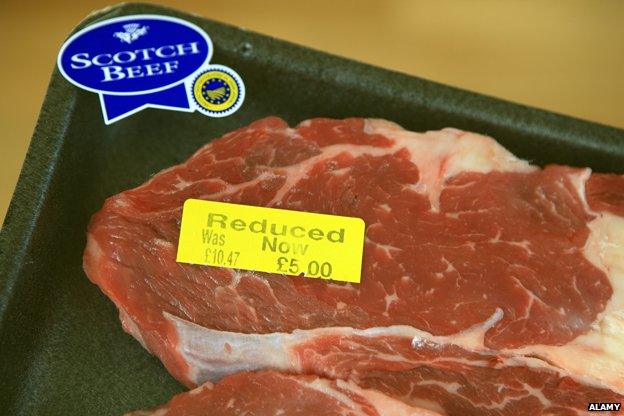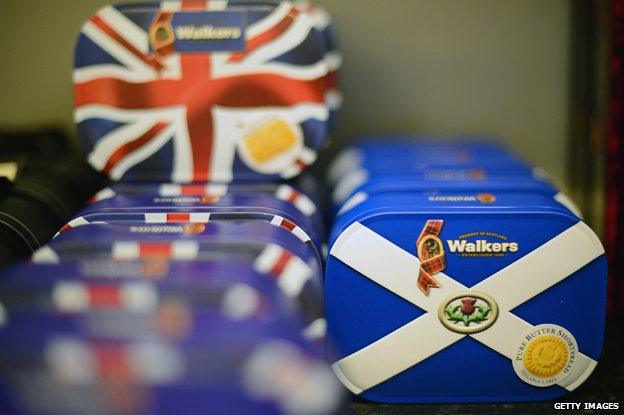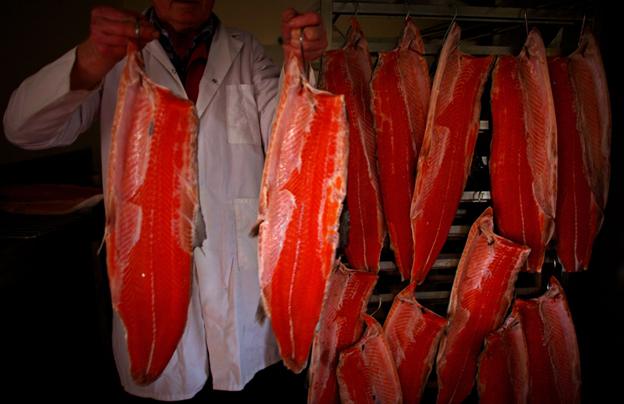What price Scottish independence?
- Published
- comments

Some of the fuss and furore about whether prices in an independent Scotland would be higher than in the rest of the UK is bonkers.
When retailers - food and non food - say they might have to push up their prices if Scotland were to introduce higher taxes or rates or if it were to change employment and planning laws, this is simply to remind Scots why they are voting for or against independence.
The whole point of Scotland becoming a separate nation, for its proponents, is to give Scots the ability to make different choices about the nature of the society they inhabit from what prevails in the rest of the UK.
Inevitably those choices would have an impact on businesses. And frequently they would have an impact on the level of prices.
So talking about the emergence of inevitable price differentials between Scotland and an independent UK is to say something stunningly obvious and uninteresting.
For example we don't expect prices to be the same in UK and France, because the UK and France make different choices about the structure of their respective economies, and these choices have an impact on the productivity and pricing policies of their respective businesses.
This is surely to highlight one of the good things about independence for Scotland, which is that if Scottish people have different priorities from the rest of the UK when it comes to how they want to use the tax system to distribute wealth, as one instance, well they could for the first time put those priorities into practice.
But of course in exercising that new ability to choose, there would be an impact on - among things - the costs for business.
And of course there are a whole bunch of things an independent Scotland could choose to do, from encouraging investment to improving infrastructure, which could boost the efficiency of business and lead to reduced prices.
But that is not the whole story.
There are some unavoidable financial costs of becoming independent which the Scots cannot dismiss as scaremongering by a Westminster patriarchy.
They should see these costs, perhaps, not as an overwhelming reason to vote against independence, but as simply the tariff or entry fee for autonomous statehood.
So what are these costs?
Well the first one is short term. Which is that investment always falls in a time of uncertainty.

The uncertainties about the nature of an independent Scotland are material for business, especially the uncertainty about what currency it would use and the timing of its membership of the European Union.
And unless and until the economic and monetary structure of a newly independent Scottish nation were conspicuous and set, there would be less investment - and therefore a temporary dip in growth.
Strikingly, the former boss of Sainsbury's, Justin King, told me last night in a BBC interview that the UK's supermarket groups have already disproportionately cut their investment in new stores in Scotland - because of the uncertainties brought about by the referendum vote.
It is very unclear how long the uncertainty tariff would be levied on Scotland. But the important point is that it would wash out over a period of years, as the country's new governance arrangements bedded down.
But there are two other costs of a more permanent nature, and a serious contingent cost.
One permanent cost is that Scotland is a smaller market than the whole UK.
It is almost too trite to mention, but there are benefits to business in operating in as frictionless and large a market as possible - the more consumers who can be reached cheaply and easily by a business, the more efficient it is.
And as soon as a market fragments into separate markets, with different regulations, different taxes and so on, the more that costs for business increase.
For the avoidance of doubt, a fragmentation of the UK's single market would push up costs on both sides of the Scottish border. But they are likely to rise relatively more north of the border, because the new market created there would be smaller.
Would these cost increases from market shrinkage north of the border be penal?
Definitely not.
But they are not an illusion.
Second, most of us do some patriotic shopping. We buy Scottish salmon or Scottish beef, in preference to Norwegian salmon or Irish beef, because we get some kind of pleasure from supporting our kin and our own economy.
But once Scotland is a foreign country and a foreign economy, that patriotic motivation for buying Scottish will vanish.

Scottish smoked salmon - just another import after independence?
And there would be a related marketing problem for Scottish producers.
Right now they can label their products as British, to stir up our patriotic buying instants. That British label would no longer be available to them. And the absence of that label could have a negative impact on their ability to sell to the rest of the UK.
Justin King (again) fears this inability to badge their products as British could be particularly harmful for Scotland's important food industry.
Finally, there is the bloomin' currency.
If Scotland was forced to adopt its own currency, and did not peg it permanently and sustainably to the pound, there would be substantial costs for exporters on both sides of the border - the cost of converting the currency, and the cost of hedging the currency against fluctuations.
Inevitably these costs would be passed on to Scottish consumers, and would also lessen the competitiveness of Scottish businesses when selling across the border into the rest of the UK.
It is however important to stress that none of these permanent and contingent costs would turn Scotland from a rich country into a poor country.
Almost no one serious doubts that Scotland will be a relatively prosperous country in the long term, whichever road it chooses.
Equally independence is not a free lunch.
What Scots people have to decide is whether the prize of self-determination, self-government and self-expression is more valuable to them than a bit of economic growth and future financial prosperity that would be lost (and sorry that neither I nor anyone can quantify precisely this income sacrifice).